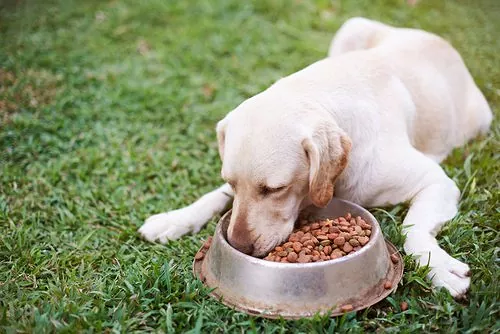Dogs are often seen as greedy creatures, always seeking a new meal or waiting for permission to get anything on the dinner table. This behavior, while sometimes pleasant, can be confusing for dog owners.
By understanding the reasons behind this apparent greed, pet owners can help better manage their dogs’ eating behaviors and ensure their pets maintain a healthy lifestyle. From evolutionary change to psychological factors, there are many explanations that shed light on why dogs exhibit such a wild appetite.
Table of Contents
ToggleReason why are dogs so greedy
Evolutionary Adaptations
One of the main reasons dogs seem to be greedy comes from their developmental history. As offspring of wolves, dogs have developed the habit of eating as much food as possible when it is available. Wild food can be hard to come by, so this strategy helps you get through tough times. This instinct often translates into modern dogs being constantly on the lookout for plenty of food, even when they have food on a regular basis.
Psychological Factors
In addition to developmental factors, psychological factors also play an important role in dog greed. Dogs may beg for food or overeat due to boredom, anxiety, or learned behaviours. For example, if a cat gets a piece of food or tableware every time it begs, it quickly learns to associate begging with reward. This energy supply makes it easier to transfer and supports the underlying corruption.
Nutritional Needs
Another factor that causes obesity in dogs is diet, feeding frequency, and the type of food that the dog takes. Dogs that may not receive adequate nutrients or may be fed at random intervals may appear as beggars as they try to compensate for the times they have gone without food. That is why, by closely paying attention to its feeding and making sure that its diet is perfectly balanced for nutritional value, some of the greediness can be cut down.
Medical Conditions
Certain medical conditions can also increase appetite in dogs.Conditions Similar as diabetes, Cushing’s complaint, or thyroid problems can beget increased hunger and consequent jones . It’s important for pet possessors to cover their canine’s diet and consult a croaker if they notice any significant changes, as these can indicate underpinning health issues.
How to Deal with a Greedy Dog

Here are some effective strategies to address and manage your dog’s insatiable appetite:
Implement Portion Control
There are many ways that an owner can try to deal with a greedy dog, and one of the simplest is portion control. Feed your dog portions, your dog’s dietary, feeding at fixed times should be maintained. Always avoid free food where food is available, as this encourages overeating. Using a slow meal can also help your dog reduce food intake, giving his brain enough time to register as full.
Provide Mental and Physical Stimulation
Tykes frequently parade greedy geste out of tedium or anxiety. icing your canine gets plenitude of physical exercise and internal stimulation can significantly reduce this geste . Interactive toys, mystification affluents, and regular walks can keep your canine engaged and satisfied, lowering their tendency to supplicate for food or scavenge.
Establish a Routine
Tykes are brutes of habit and need to know when it’s mealtime, thus it would help not to indulge them with treats when they supplicate for food at odd times of the day. Maintain the routine as much as possible and try not to feed your canine outside the schedule and don’t feed your canine directly from the table or in between refections. Consistency will help your dog understand when to expect food and minimize greedy behaviors outside these times.
Train Alternative Behaviors
Educate your canine indispensable actions that can replace soliciting or scavenging. For case, train your canine to sit or lie down while you are eating or preparing food. Use positive underpinning to award these actions rather than giving in to soliciting. Over time, your canine will learn that calm geste is more satisfying than being greedy.
Monitor and Adjust Diet
Insure that your canine is entering a well- balanced diet that meets their nutritive conditions. Consult your veterinarian to choose a high- quality canine food that provides all the necessary nutrients. occasionally switching to a diet high in fiber can help your canine feel fuller for longer and reduce cases of rapacity.
Regular Health Check-ups
Regular veterinary check- ups are essential to rule out any medical conditions that might be causing your canine’s increased appetite. Conditions like diabetes, thyroid issues, or spongers can contribute to inordinate hunger. Beforehand discovery and treatment of similar conditions can help manage your canine’s appetite more effectively.
Tips for Managing and Correcting Greediness in Dogs
Remain consistent with training and feeding routines.
- Avoid giving in to soliciting or scavenging actions, as this reinforces the geste .
- If you see any considerable changes in your dog’s feed routine, consult a doctor.
- give plenitude of physical exercise and internal stimulation to keep your canine satisfied and engaged.
- Use slow confluent coliseums or portion control to manage your canine’s food input.
- Train alternative behaviors that can replace begging or scavenging, such as sitting or lying down calmly while you eat.
Final Thought
Wanting food means different things to our dogs , it is how they were pre-programmed to act, how they process emotions, and even if they are overeating. This way, dog owners can minimize instances of voracious eating by the pet and ensure that the dog consumes better foods and maintains a healthy regimen by regular activity, sufficient food intake, mental challenges, and physical checkups. If handled well, both with the veterinarian and by implementing various behavioral patterns, you can keep your dog well fed, healthy, and obedient and therefore, lessen the stress on both ends of the bowl.







